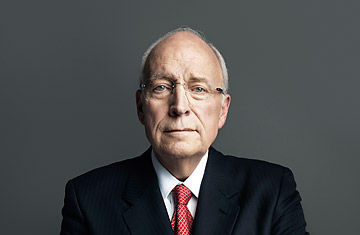
(2 of 3)
Years later, Cheney contradicted the President more publicly, filing a brief with the Supreme Court that opposed Bush's position on gun control. Technically, he did so as president of the Senate. Afterward, he instructed his lawyer to tell the outraged White House chief of staff, Josh Bolten, that "the Senate functions of the vice president were the vice president's business." The court sided with Cheney. Bush, who chose his battles, "never said a word to me about it," Cheney writes.
Sept. 11, 2001, commenced the age of Cheney Unbound. Almost single-handedly he redirected the President's gaze from al-Qaeda to a more frightening specter: a "nexus" of terrorists, state sponsors and weapons of mass destruction. "Terrible as 9/11 had been, the next attack, if it involved nuclear or biological weapons, would be exponentially worse," he writes. Cheney was so worried about weaponized smallpox, then and now a hypothetical threat, that he tried to persuade Bush to inoculate every American.
Early on 9/11, he kept the President from returning to Washington, personally directing Bush's plane to Offutt Air Force Base in Nebraska. He ordered combat pilots to shoot down hijacked civilian aircraft, and he stands by the story that "in one of our earlier calls, the president had approved my recommendation." No record of such a call appears in nearly two dozen logs maintained that morning at the White House and aboard Air Force One.
Cheney, for the first time, claims paternity of the four most significant responses to 9/11. There were other advocates of the pivot from al-Qaeda to Saddam Hussein, but Cheney told Bush from Day One that "it was important to deal with the threat Iraq posed," and he says he had the last private word with the President before the order to go to war. Cheney and his legal allies invented military commissions for terrorism suspects at Guantánamo Bay, hoping to "prevent them from having access to U.S. courts." The Vice President cleared the way, legally and operationally, for "enhanced interrogation techniques" like waterboarding, which until then had been deemed a war crime by successive U.S. governments. And he tells in some detail of his role as creator and supervisor of a domestic surveillance operation by the National Security Agency, known inside the Bush Administration as "the vice president's special program."
Here Cheney's account is less than honest. The domestic espionage provoked a crisis inside the Administration in 2004, one that came to a head in a hospital visit to the gravely ill Attorney General John Ashcroft. The Justice Department had come to believe that parts of Cheney's surveillance operation were illegal. Deputy Attorney General James B. Comey, standing in for the ailing Ashcroft, refused to reauthorize the program as it came due to expire. White House chief of staff Andrew Card and counsel Alberto Gonzales brought the papers to Ashcroft in intensive care, blowing past objections from his doctors. When Ashcroft refused to sign, Bush renewed the program anyway.
Cheney rewrites the story top to bottom. Gonzales and Card made the hospital trip, he insists, because Ashcroft had already told Bush by phone "that he would sign the documents" and then later "changed his mind." And there was no intent to circumvent Comey, Cheney adds, because no one knew Ashcroft had relinquished his powers to his deputy. Either of those claims would be big news if true, but there is good reason to believe that Cheney knows they are not.
Contemporary notes from Ashcroft's FBI security detail, for example, said Janet Ashcroft refused to allow Bush to speak to her husband. The President told her "Gonzales and Card were coming to the hospital to see Ashcroft regarding a matter involving national security," according to the FBI notes. In Bush's memoir, the President writes that he referred to the subject only as "an urgent matter." Cheney would have readers believe instead that the President discussed a code-word-classified intelligence program on an open phone line, that Ashcroft was lucid and that he reversed his position twice within an hour. As for Ashcroft's being incapacitated, the man was drifting in and out of consciousness and was close to death. It had been five days since the Office of Legal Counsel faxed formal notice to Gonzales that Comey assumed "all the power and authority of the attorney general," and the news had been broadcast on CNN.
